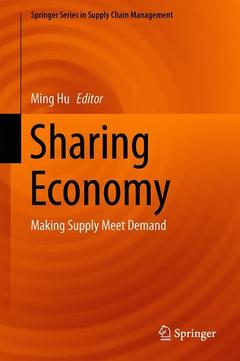Description
Sharing Economy, 1st ed. 2019
Making Supply Meet Demand
Springer Series in Supply Chain Management Series, Vol. 6
Coordinator: Hu Ming
Language: English
Support: Print on demand
Description
/li>Contents
/li>Biography
/li>Comment
/li>
This edited book examines the challenges and opportunities arising from today?s sharing economy from an operations management perspective. Individual chapter authors present state-of-the-art research that examines the general impact of sharing economy on production and consumption; the intermediary role of a sharing platform; crowdsourcing management; and context-based operational problems.
Sharing economy refers to a market model that enables and facilitates the sharing of access to goods and services. For example, Uber allows riders to share a car. Airbnb allows homeowners to share their extra rooms with renters. Groupon crowdsources demands, enabling customers to share the benefit of discounted goods and services, whereas Kickstarter crowdsources funds, enabling backers to fund a project jointly. Unlike the classic supply chain settings in which a firm makes inventory and supply decisions, in sharing economy, supply is crowdsourced and can be modulated by a platform. The matching-supply-with-demand process in a sharing economy requires novel perspectives and tools to address challenges and identify opportunities.
The book is comprised of 20 chapters that are divided into four parts. The first part explores the general impact of sharing economy on the production, consumption, and society. The second part explores the intermediary role of a sharing platform that matches crowdsourced supply with demand. The third part investigates the crowdsourcing management on a sharing platform, and the fourth part is dedicated to context-based operational problems of popular sharing economy applications.
?While sharing economy is becoming omnipresence, the operations management (OM) research community has begun to explore and examine different business models in the transportation, healthcare, financial, accommodation, and sourcing sectors. This book presents a collection of the state-of-the-art research work conducted by a group of world-leading OM researchers in this area. Not only does this book cover a wide range of business models arising from the sharing economy, but it also showcases different modeling frameworks and research methods that cannot be missed. Ultimately, this book is a tour de force ? informative and insightful!?
Christopher S. Tang
Distinguished Professor and Edward Carter Chair in Business Administration
UCLA Anderson School of Management
Ming Hu is a Professor of Operations Management at Rotman School of Management, University of Toronto and one of the 2018 Poets & Quants Best 40 Under 40 MBA Professors. His research has been featured in media such as Financial Times. Most recently, he focuses on operations management in the context of sharing economy, social buying, crowdfunding, crowdsourcing, and two-sided markets, with the goal to exploit operational decisions to the benefit of the society. He is the recipient of Wickham Skinner Early-Career Research Accomplishments Award by POM Society (2016) and Best Operations Management Paper in Management Science Award by INFORMS (2017). He currently serves as the editor-in-chief of Naval Research Logistics, co-editor of a special issue of Manufacturing & Service Operations Management on sharing economy and innovative marketplaces, and associate editor of Operations Research and Manufacturing & Service Operations Management, and senior editor of Production and Operations Management. He received a master's degree in Applied Mathematics from Brown University in 2003, and a Ph.D. in Operations Research from Columbia University in 2009.
First book to examine sharing economy from an operations management perspective
Editor and contributors are leaders in the field
Considers the realities of particular companies, including Uber and AirB&B




